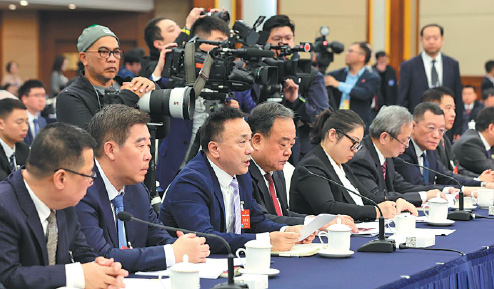Open panel discussion grabs media attention
Reporters invited to Guangdong to see its scenery, changes, culture
A panel discussion of the Guangdong delegation in Beijing during the country's ongoing second session of the 14th National People's Congress aroused much interest among domestic and foreign media on Thursday, which was the open day for the delegation.
A total of 225 reporters from 102 domestic and overseas media outlets covered the open panel discussion in which NPC deputies from Guangdong engaged in lively deliberations on this year's Government Work Report, reviewing plan reports, budget reports and drafts.
The reporters raised questions about Guangdong's high-quality development in rural areas, coordinated development between urban and rural areas, the development of the Guangdong-Hong Kong-Macao Greater Bay Area, and how Guangdong will further fortify its real economy and cement its foothold as China's export leader, as well as the high-quality growth of its marine economy, among other topics.
Responding to a reporter's question, Huang Kunming, secretary of the Guangdong Provincial Committee of the Communist Party of China, said imbalanced development between urban and rural areas is a fact and a problem that Guangdong must face and solve; and the high-quality development project for Guangdong counties, towns and villages is the key to the issue.
With all the efforts for over a year, the institutional mechanisms for the project have improved and a series of policies and measures have been formulated, he said, noting: "Initial progress has been made." He invited media friends from home and abroad to Guangdong.
"Guangdong is rich in delicious food and amazing scenery," he said, adding that media friends can taste the delicacies of Guangdong, experience the beauty of Lingnan as well the stunning views of the Chinese white dolphins in Zhanjiang thanks to the province's efforts to protect its ecology.

A total of 225 reporters from 102 domestic and overseas media outlets cover the Guangdong delegation's open panel discussion during the ongoing second session of the 14th National People's Congress on Thursday. WANG ZHUANGFEI/CHINA DAILY
Answering the question of a reporter from a Singaporean media outlet, Wang Weizhong, governor of Guangdong, said: "The added value of Guangdong's manufacturing industry accounts for 32.7 percent of the province's GDP, with its scale representing one-eighth of the nation's total; and Guangdong has eight industrial clusters capable of yielding annual output value of at least 1 trillion yuan ($138.94 billion) each."
For a long time, he said, Guangdong has been resolutely committed to participating in and promoting the global industry and value chains, actively supporting enterprises in their "going global" efforts and participation in the construction of the Belt and Road Initiative.
Zhang Hu, executive vice-governor of Guangdong, dwelled on the province's plan to further the development of the GBA, while Shenzhen Mayor Qin Weizhong and Zhanjiang Mayor Zeng Jinze respectively elaborated on Shenzhen's opening-up initiatives and Zhanjiang's endeavors to develop the marine economy.
Several Guangdong NPC deputies focused on the development of the marine economy during yesterday's event.
Among them, Ning Ling, who is also the vice-president of Guangdong Ocean University, said Guangdong's marine industry has achieved leapfrog development in recent years, and the province's economic aggregate of the marine economy has ranked first in the country for 29 consecutive years.
"In terms of land-sea linkage, Guangdong has formed an open highland to the sea with a focus on the pilot free trade zone areas of Nansha, Qianhai and Hengqin and the Shenzhen Park of the Hetao Shenzhen-Hong Kong Science and Technology Innovation Cooperation Zone," said Ning, adding that the province has built an international seaport hub with global competitiveness centered on Guangzhou and Shenzhen ports.
"The combination of port systems in the Guangdong-Hong Kong-Macao Greater Bay Area has covered 90 percent of the cities in the GBA," said Ning, who is also executive dean of the Guangdong Academy of Coastal Economic Belt Development.
Meanwhile the deputies suggested that the province expand investment in scientific innovation and research and development to cultivate more driving forces and new products and services to further strengthen the development of Guangdong's manufacturing industry.
Huang Zhihao, mayor of Zhuhai, said the advantage of Hong Kong and Macao lies in the service industry and its attractiveness to international talents, while the advantage of the Pearl River Delta lies in the manufacturing industry.
Huang proposed that the platform of the Guangdong-Macao In-Depth Cooperation Zone in Hengqin be used to promote the deep integration of modern service industries in Hong Kong, Macao and Hengqin, with manufacturing industries in Pearl River Delta cities such as Zhuhai, Zhongshan and Jiangmen, and enable more production and manufacturing in the Pearl River Delta and R&D in Hengqin.
Xie Hongzhou with GDToday contributed to this story.



 Print
Print Mail
Mail

